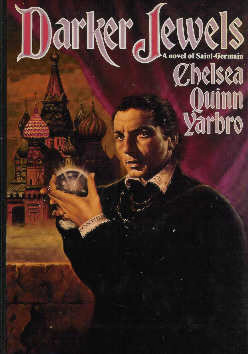

 |

|

The average rating for Darker jewels based on 2 reviews is 2 stars.
Review # 1 was written on 2009-08-18 00:00:00 Dean Burke Jr. Dean Burke Jr.Saint-Germain makes jewels (don't ask) for Ivan the Terrible in 16th century Russia. Not one of my favorites of the series. I enjoy these, but I need to remember to space them out because they all have pretty much the same plot transposed into a different setting. It's as if Saint-Germain is doomed to live out the same drama over and over again as he moves through the ages, with new players and new scenery but without being able to alter the outcome. No wonder he's so melancholy. (I should start tallying the various injuries Saint-Germain has endured. The man has been disemboweled, crucified, flogged, poisoned, shot, and stabbed with every sort of sharp implement known to man. And I've only read about half of the series.) Saint-Germain marries in this book. I think it's the only time in 4,000 years that he does so. But his relationship with his wife is pretty par for the course, nothing special; she's no Olivia or Madelaine. I like Olivia's haranguing letters (written from the court of Elizabeth I of England in this book) but otherwise I'm mostly bored by the letters that the author uses to begin each chapter. |
Review # 2 was written on 2014-02-11 00:00:00 Nicole Peake Nicole Peake2.5 stars *sigh* So this book follows Saint-Germain to Russia during the time of Ivan IV as part of a Polish embassy for...some reason...it's really not clear...look, that's part of the problem, ok? Let's break this down. The flaws: 1) I cannot tell you how disappointed I was when I realized this was going to be Ivan IV post-his-son's-death. I see this happen with Henry VIII too. So many authors fall into the trap of thinking that because the "angry, old, raving tyrant" version of a historical figure is the most well known, it is therefore the most interesting. Anyone who has ever studied history knows that it's actually the YOUNGER versions of these figures that are the most fascinating, because they still have hopes and are conflicted and bla bla bla. (fascinating, complex, conflicted Ivan IV) (This book's Ivan IV) 2) This is one more book where Christians are the main bad guys because Christians are eeeeeeeevil. Look, we get it, Chelsea Quinn Yarbro, you don't like Christians. You think they did nothing but ill for humanity. That's fine, that's great, I have no problem with that. But when you keep doing it over and over again in your books, it stops being about making a point, and it starts being unimaginative writing. Evil Christians are evil because they are and there's no other motivation. Here's the thing: some religious people are evil because of their religion. Some religious people are evil in spite of their religion. Some religious people use their religion as an excuse to hide some darker motivation. And some religious people are evil and it has nothing to do with their religious affiliation, they're just greedy or prideful or envious or whatever. But in Yarbro's world, there's only 1 motivation for religious people being evil (religious fervor/superstition, which if you'll notice is not really a reason - there needs to be a reason behind that reason in order to really be a reason arg), and it gets old really really quickly. The bad guys are all the same, and they all have the exact same motivation. In fact it's gotten to the point where I have decided to skip several books in the series because, despite the fact that they are set in really interesting time periods and places, I just can't do it again. I can't. I'm tired. They've just become 80s cartoon villains. (Skeletor has more complex motivations that these bad guys) 3) But the above brings up another problem: it's not just that the bad guys have little true motivation, the good guys (and neutral guys) don't either. Ivan IV favors Saint-Germain because he has to in order to further the plot. Benedict Lovell and Boris Gudonov like Saint-Germain because it furthers the plot. The only characters that feel like fleshed out people are Saint-Germain himself and the character Xenya. Everyone else just does what they need to do to get the plot going where it needs to go, and that's the only explanation you're going to get, sorry. 4) Which leads to the next problem -- since Saint-Germain and Xenya and the only characters with depth, that means that any time one of them isn't on the page, the book is boring boring boring. I am actually a huge fan of Russian history and I love all the boyar politicking, but this book's description of it put me to SLEEP. Because the book wasn't totally a waste, I'll mention the good points: 1) The scenes between Saint-Germain and Xenya were actually quite lovely and really pretty sexy, and that's saying a lot coming from someone who really really hates overdone sex scenes. If Yarbro wrote her political maneuvering scenes with the same skill that she did with her more personal, relationship scenes, I would be eating these books up with a spoon. (Oh yeah, get some!) 2) Usually the percentage of the stupid letters between the chapters that are useful and move the plot along is 0%; in this book, it's a whopping 25% or so. So that's an improvement. *Sigh* Honestly, at this point I don't know if it's even worth it to try to read some of the others -- maybe the ones set in the 20th century? People who have read these books: are there ANY that don't focus on the evulz of religion? |
CAN'T FIND WHAT YOU'RE LOOKING FOR? CLICK HERE!!!